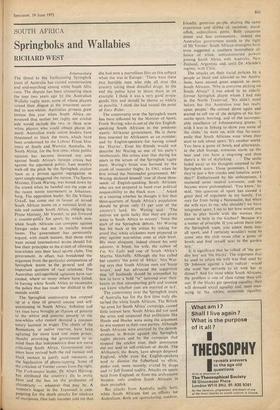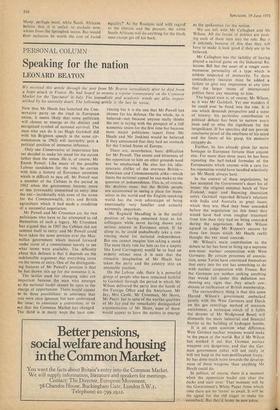SOUTH AFRICA
Springboks and Wallabies
RICHARD WEST
Johannesburg The threat to the forthcoming Springbok tours of Australia has caused consternation and soul-searching among white South Afri- cans. The dispute has been simmering since the tour two years ago by the Australian Wallaby rugby team, some of whose players voiced their disgust at the treatment accor- ded to non-whites. Australian protests grew intense this year when South Africa an- nounced that neither her rugby nor cricket side would include the two or three non- white players who could obtain places on merit. Australian trade union leaders have threatened to black the tours, which have been condemned by the Labour Prime Min- isters of South and Western Australia. In South Africa, for the first time, white public opinion has become incensed not only against South Africa's foreign critics but against the apartheid policy. Last month's walk-off the pitch by the Springbok cricket team as a protest against segregation in sport simply staggered the nation. The Sports Minister, Frank Waring, was booed down by the crowd when he handed out the cups at the recent tennis tournament in Johannes- burg. The opposition leader. Sir De Villiers Graaff, has come out in favour of mixed South African teams on a national level in- side and outside South Africa, obliging the Prime Minister, Mr Vorster, to put forward a counter-policy for sport, by which non- white South Africans can compete against foreign sides but not in racially mixed teams. The government has persistently argued, with much success, that those who want mixed international teams should fol- low their principles to the extent of allowing non-whites into their local sports clubs. The government, in effect, has broadened the argument from the particular composition of Springbok teams to the general and all- important question of race relations. The Australian anti-apartheid agitators have suc- ceeded, where so many others have failed, in forcing white South Africa to reconsider the policy that has made her disliked in the outside world.
The Springbok controversy has cropped up at a time of general unease and self- questioning in South Africa. Inflation and tax rises have brought an illusion of poverty to the whites and genuine poverty to the non-whites who cannot demand a compen- satory increase in wages. The chiefs of the Bantustans, or native reserves, have been agitating for' more land and more power, thereby provoking the government to re- mind them that indepeadenee does not mean criticising South Africa. Government min- isters have revived both the red menace and black menace to justify such measures as the legalisation of phone-tapping. Some of the criticism of Vorster comes froin the right. The Verkrampte leader, Dr Albert Hertzog, has attributed the country's ills to erotic films and the ban on the profession of chiropracty — whatever that may be. A Women's league in the Transvaal is cam- paigning for the death penalty for smokers of marijuana. One lady member told me that she had seen a marvellous film on this subject when she was in Europe: 'There were these two horrible men who ride all over the country taking these dreadful drugs. In the end the police have to shoot them as an example. I think it was a very good propa- ganda film and should be shown as widely as possible.' I think she had missed the point of Easy Rider.
The controversy over the Springbok tours has been inflamed by the Minister of Sport, Frank Waring, who is one of the few English- speaking South Africans in the predomi- nantly Afrikaner government. He is there- fore resented by Afrikaners as an outsider, and by English-speakers for having joined the 'Hairies'. Even his friends would not describe Mr Waring as one of his party's intellectuals. His critics aver that during his years in the scrum of the Springbok rugby team. Waring's brain was harmed by the crush of muscular thighs. In 1961, when he first joined the Nationalist government. Mr Waring declared himself 'one of those thou- sands of English-speaking South Africans who are not prepared to hand over political responsibility to the black man . . .' Asked at a meeting whether he thought it fair that three-quarters of South Africa's population should be given only 13 per cent of the country's land, Mr Waring said : 'The natives are quite lucky that they are given areas in South Africa to occupy'. Since the start of the Springbok debate. Mr Waring has hit back at his critics by asking for proof that white cricketers were prepared to play against non-whites even at club level. His most eloquent, indeed almost his only admirer, is Joyce. his wife, the author of I'm No Lady and one of South Africa's Martha Mitchells. Although she has called her country 'the jewel of Africa'. Mrs War- ing says that South African men arc 'lousy lovers', and has advanced the suggestion • that 'all husbands ;hould be compelled by law to have a bold "NI" tattooed over their hearts so that unsuspecting girls and women can know whether men are married or not'.
The controversy over the Springbok tours of Australia has for the first time truly dis- turbed the white South Africans. The British 'no arms for South Africa' campaign, caused little interest here. South Africa did not need the arms and suspected that politicians like Heath and Healey were using the argument to win support in their own parties. Although South Africans were annoyed by the demon- strations in Britain against the Springbok rugby players and by the campaign that stopped the cricket tour, their annoyance did not lead to self-criticism or doubt. The Afrikaners. the Boers, have always despised England, while even the English-speakers tend to dismiss the fatherland as effete, pinko and, more recently, crazed by drugs and Tv full frontal nudity. Attacks on apart- heid from England, or from the arch-enemy Sweden, only confirm South Africans in their prejudice. But attacks from Australia really hurt; white South Africans feel an affinity for Australians. Both are sports-loving, outdoor, friendly, generous people, sharing the same experience and dislike of snobbish, stand- offish, supercilious poms. Both countries detest and fear communism: indeed the Australian government stands to the right of Mr Vorster. South African strategists have even suggested a southern hemisphere al- liance of white, anti-communist powers joining South Africa with Australia, New Zealand, Argentina and, until Dr Allende's regime, with Chile.
The attacks on their racial policies by a people so liked and admired as the Austra- lians, have caused great anguish to most South Africans. 'Why is everyone picking on South Africa?' l was asked by an elderly former Springbok player whom 1 had met in the North Transvaal. 'We didn't mind before but this Australian tour has really upset people.' He calmed down again and started to tell me of the delights of his fav- ourite sport, bowling, and of the incompar- able excellence of Johannesburg greens. 'I wish I was in Joburg to show you some of the clubs,' he went on, with that far-away smile that South Africans wear when they start to talk about sport. `It's another world. You have a game of bowls and afterwards, in the club lounge, someone starts up the beer and you have a sing-song and then there's a bit of skylarking . . .' The smile faded away as his thoughts returned to the Springbok tours. These protesters, I mean, they're just a few cranks and lunatics, aren't they?' Embarrassed by his unhappiness, I muttered some neutral comment, and he became more philosophical. 'You know,' he said, 'this question of sport has caused a great deal of argument in my family. I'm very far from being a Nationalist, but when the wife says to me, why shouldn't we have integrated sport. I say to her how would you like to play bowls with the woman that conies to help in the kitchen? Because it's a matter of principle. If you admit them into the Springbok team, you admit them into all sport, and I certainly wouldn't want to come into the club room after a game of bowls and find myself next to the garden boy.'
It is significant that he talked of 'the gar- den boy' not 'the blacks'. The argument that he used to refute his wife was that used by Dr Johnson against a lady radical: would she want her servants to sit with her at dinner? And for most white South Africans, the problem is one of class rather than col- our. If the blacks get sporting equality, they will demand social equality and; most men- acing to the %%lilies, economic equality. Many, perhaps most, white South Africans believe that it is unfair to exclude non- whites from the Springbok teams. But would their inclusion be worth the cost of racial equality? As the Russians said with regard to the liberals and the peasant, the white South Africans will do anything for the black man except get off his back.



































 Previous page
Previous page